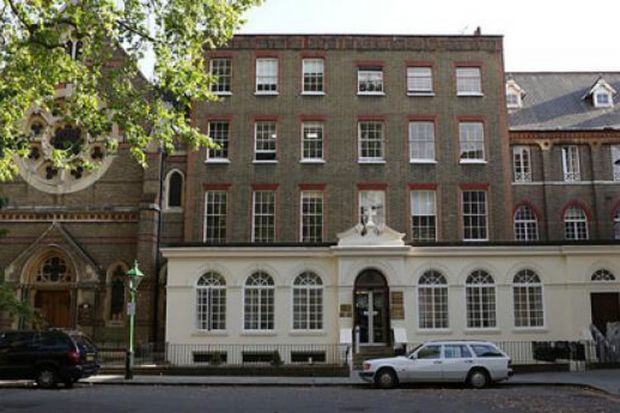University of London
College plans federal secession
Heythrop College is to withdraw from the University of London after admitting that financial pressures have left it unable to continue its current teaching. The Catholic institution, which is located in Kensington, West London, will leave the federal university in summer 2018 after fulfilling its commitments to existing students, it announced on 26 June. The news raises uncertainty over the future of teaching at the college, which specialises in philosophy and theology, and has around 660 students and 90 staff. The announcement follows the conclusion of talks spanning more than a year between Heythrop and St Mary’s University, Twickenham – another Catholic institution – about forming a strategic partnership that would help lower Heythrop’s administration costs. However, the college said it did not have the funds to enter a partnership with St Mary’s or any other higher education institution.
Higher education legislation
CMA advises state to fill in gaps
The head of the Competition and Markets Authority has written to Sajid Javid, the business secretary, urging the government to introduce new higher education legislation. Alex Chisholm, the CMA chief executive, says in his letter that “gaps and discrepancies in regulatory oversight mean that different types of institution are being quality assured in different ways” – a reference to regulation for private providers. He also says there is “no comprehensive, sector-wide system in place to facilitate exit and protect students in the event an institution leaves the HE sector”. Mr Chisholm adds: “We recognise that some of these reforms are likely to require legislation. We feel this is necessary to allow choice and competition to work in the interests of students.” The CMA published recommendations on higher education competition and regulation earlier this year.
Research funding
Robbing Peter to employ Paul?
A new European Union programme will be partly funded by €2.2 billion (£1.57 billion) previously allocated to university research, it has been confirmed. Plans for the European Fund for Strategic Investments were formally approved by the European Parliament on 24 June, enabling its implementation later this year. University leaders and senior scientists have spoken out against the use of funds from the EU’s Horizon 2020 programme to kick-start the job-focused investment fund, which has been instigated by Jean-Claude Juncker, the European Commission president. The proposed cuts, initially worth €2.7 billion, were scaled back by €500 million in the face of opposition from MEPs and the scientific community.
Tuition fees
MP draws up itemised bill
A Conservative backbencher has introduced a private member’s bill to require universities to give information to students about how their fees are spent. The summary of the yet to be published bill from Heidi Allen, the newly elected MP for South Cambridgeshire, says it would “require information to be made available to prospective undergraduate students about what is provided to students for the tuition fees charged, how tuition fee resources are expended and what is expected of students; to establish transparency in how tuition fees are spent; and for connected purposes”. Ms Allen’s bill was drawn 15th on the list of private members’ bills, meaning it will not be among those most likely to secure debating time. Few private members’ bills become law.
Follow Times Higher Education on Twitter
Last week’s news that Queen Mary University of London may look at changing the status of PhD students to make them employees caught the attention of many on Twitter. @TheLitCritGuy posted he was “seriously hoping this becomes the norm”, while @askitas commented: “About time.” However, others were more circumspect. @MsFloraPoste tweeted: “Extreme skepticism re making phd students employees. What about self-funders?” And @jessicammoody posted: “If you’re going to make PhD students ‘employees’ of universities – are you going to pay them as such?”
Register to continue
Why register?
- Registration is free and only takes a moment
- Once registered, you can read 3 articles a month
- Sign up for our newsletter
Subscribe
Or subscribe for unlimited access to:
- Unlimited access to news, views, insights & reviews
- Digital editions
- Digital access to THE’s university and college rankings analysis
Already registered or a current subscriber?
